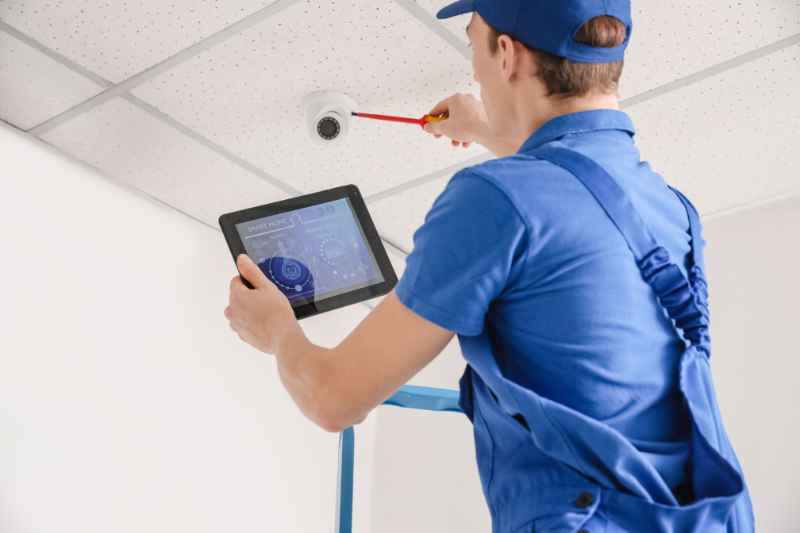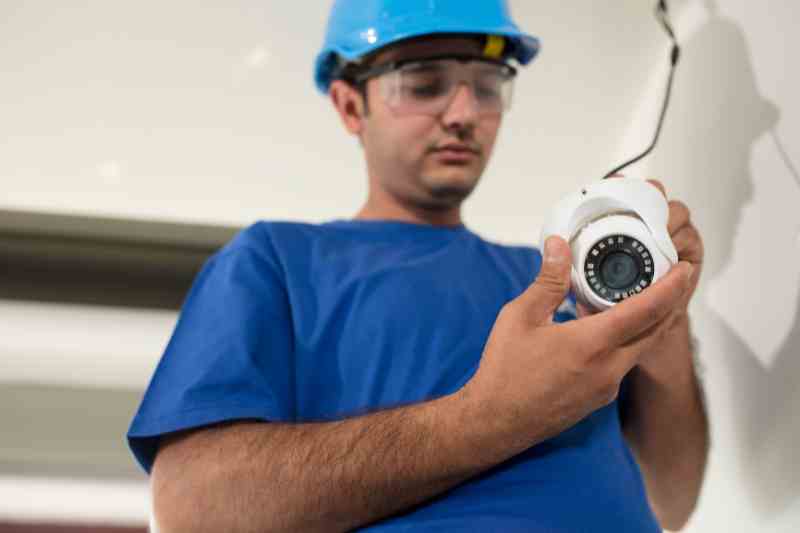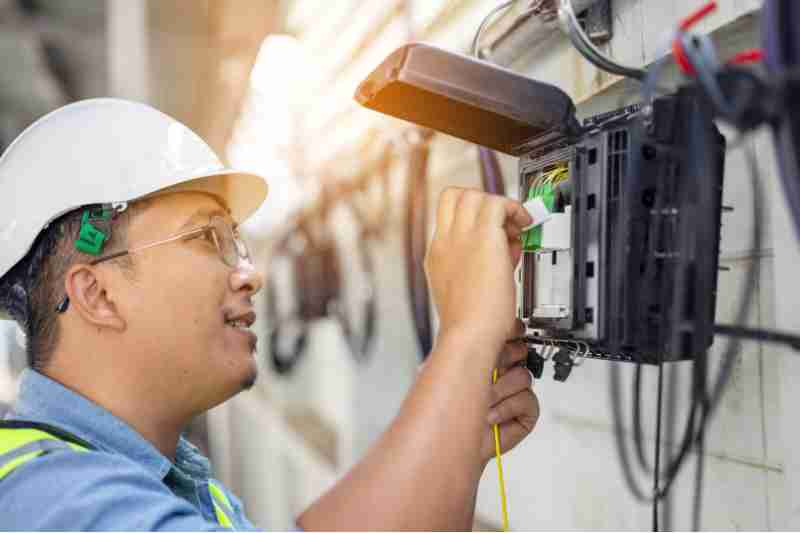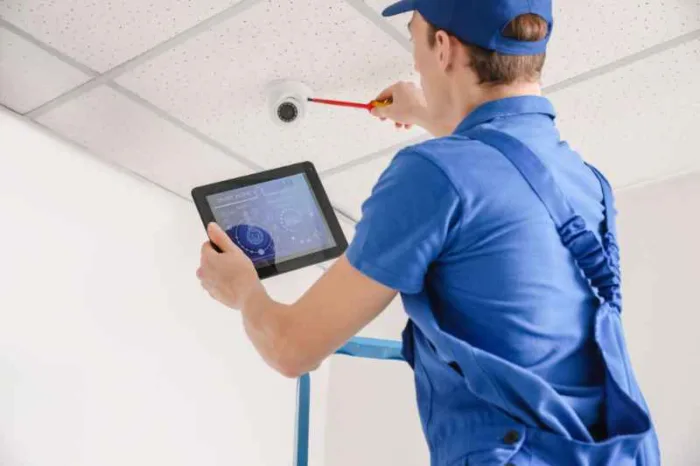Key takeaways
- A security system installer is a person who can maintain and install security hardware, such as access control systems, alarms, and other devices.
- To become a security installer, focus on honing your skills and obtaining certifications from professional organizations.
- You can also focus on developing your soft skills, acquiring hands-on experience, and specializing in a specific type of security installation.
- Stand out from your competitors by developing a business plan and marketing your business effectively.

Becoming a security system dealer or installer is a rewarding career path with opportunities for growth and specialization. By acquiring the right education, certifications, and hands-on experience, you can embark on a successful journey in this dynamic field.
The demand for security system installers is rising in today’s digital age. This guide will walk you through the steps to kickstart your career in this rewarding field. Finally, we’ll help you by listing requirements and advising you to grow your security systems installer business.
This post covers:
- What is a security system installer?
- Requirements to become a security system installer
- Step-by-step guide to becoming a security system installer
- How to start a business installing security systems
- Join an installer program
What is a security system installer?
Security system installers are skilled professionals who design, install, and maintain CCTV systems, alarm systems, access control systems, and other security solutions. They play a crucial role in safeguarding homes, businesses, and public spaces.
If you’re tech-savvy, enjoy problem-solving, and have a knack for working with your hands, a career as a security system installer might be the perfect fit for you.
Before diving into how to become a home security installer, let’s understand their primary responsibilities.
Security system installers are tasked with:
- Installing CCTV systems. Setting up closed-circuit television systems to monitor and record activity in designated areas.
- Installing alarm systems. Installing alarm systems that detect unauthorized access or breaches in security.
- Installing access control systems. Setting up systems that regulate who can enter specific areas using keycards, biometric scanners, or other methods.
- Troubleshooting and maintenance. Diagnosing and resolving issues with existing security systems and performing routine maintenance to ensure functionality.
Learn how to install ButterflyMX:
Security systems installer career pathways
Here’s a breakdown of potential career pathways as a security system installer:
- Entry-level installer: First, start as an apprentice or junior technician under the supervision of experienced professionals.
- Certified technician: Obtain industry certifications to advance your career and increase earning potential.
- Lead installer: Finally, oversee installation projects and manage installation teams.
Security systems installer salary
The average security systems installer salary ranges from $50,000 to $70,000. But depending on your experience level and the number of certifications you have, you can command a higher salary.
Requirements to become a security system installer
While formal education requirements may vary, aspiring security system installers typically benefit from further professional development.
So, to become a security system installer, focus on these aspects of your career:
1. Official certifications
By studying for an official certification, you prove that you’re knowledgeable and can handle tasks requiring high specialization.
Certain states legally require you to pass an official examination to install security systems.
To learn how to become a CCTV engineer, focus on certifications like:
- High school diploma or equivalent. Start by obtaining a solid educational foundation.
- Technical training. Then, pursue technical training proptech programs or vocational courses in electronics, electrical engineering, or computer networking.
- Certifications. Consider obtaining certifications from reputable organizations like ESA (Electronic Security Association) or ASIS International.
2. Needed skills
Successful security system installers must possess a blend of technical skills and personal attributes:
Focus on skills like:
- Technical skills. Proficiency in understanding electrical circuits, networking principles, and security system components.
- Problem-solving abilities. Ability to troubleshoot complex issues and find effective solutions.
- Attention to detail. Ensuring all installations are precise and meet industry standards.
- Customer service. Interacting with clients to understand their security needs and providing professional recommendations.
- Adaptability. Keep up-to-date with technological advancements in the security industry.
Step-by-step guide to becoming a security system installer
Now that you want to become a security systems installer, look at this step-by-step guide.
Follow these steps to become a security systems installer:
- Gain relevant education and training
- Acquire hands-on experience
- Develop soft skills
- Stay updated with industry trends
- Consider specializing

1. Gain relevant education and training
Industry certifications demonstrate your competence and credibility as a security system installer. You can get these certifications from organizations like the National Institute for Certification in Engineering Technologies (NICET) or the Computing Technology Industry Association (CompTIA).
Consider pursuing certifications such as:
- Certified Service Technician, ESA
- Certified Video Technician, ESA
- Security Industry Cybersecurity Certification, SICC
- Advanced Security Practitioner, CompTIA
- Fire Alarm Certification, NICET
To sum up, these certifications validate your expertise in specific areas of security system installation and enhance your employability.
2. Acquire hands-on experience
Gain practical experience through internships, apprenticeships, or entry-level positions with security system installation companies.
To summarize, hands-on experience is invaluable for security installers and will help you apply theoretical knowledge in real-world scenarios.
3. Develop soft skills
As in many other industries, effective communication, problem-solving, and customer service skills are essential in the security system installation field. You should hone these skills to deliver exceptional service and build strong client relationships.

4. Stay updated with industry trends
The security industry is constantly evolving with technological advancements. Stay informed about new security solutions, equipment, and industry regulations through professional development courses, workshops, and industry publications.
Moreover, you should stay informed about the industry’s leading manufacturers of security systems and access control, such as ButterflyMX or LiftMaster.
5. Consider specializing
Specializing in specific areas such as CCTV systems, home security installations, or alarm technician training can differentiate you in the job market.
To rephrase it, focus on mastering the nuances of your chosen specialization to become a sought-after expert.
How to start a business installing security systems
Even if you’ve learned all the skills you need to become an effective security installer, that’s only one part of the puzzle. You also need to know how to manage your own business to reach the biggest base of clients you can.
If you’re interested in learning how to become a security camera installer with a successful business, consider the following steps:
- Adhere to a business plan. Develop a comprehensive business plan outlining your services, target market, pricing strategy, and marketing approach.
- Consider legal requirements. Register your business, obtain necessary licenses and permits, and ensure compliance with local regulations.
- Sign up for insurance. Protect your business with liability insurance and coverage for equipment and installations.
- Market your business effectively. Finally, promote your services through online marketing, networking with local businesses, and attending industry events.
Join an installer program
The best installer program you could join is the one from ButterflyMX. Our flagship video intercom simplifies access for thousands of properties across the country — but we also offer an entire access ecosystem, including keypads, card readers, and elevator controls, that helps property managers administer every inch of their buildings.
Many security and intercom dealers have joined ButterflyMX’s dealer program because of its benefits.
Our in-depth installer program will set you up for success by:
- Helping you adapt to retrofits and new buildings alike. We integrate with dozens of the most trusted and popular names in real estate in areas like smart locks and property management software.
- Adaptable tier system. Whether you’re a local or nationwide installer company, ButterflyMX can provide you with the unique support you need. Choose between different tiers and scale up at your own pace.
- Referrals. After you sign up for our installer program, you’ll receive exclusive referrals — and whatever you need to reach more customers, like training modules and marketing support.







